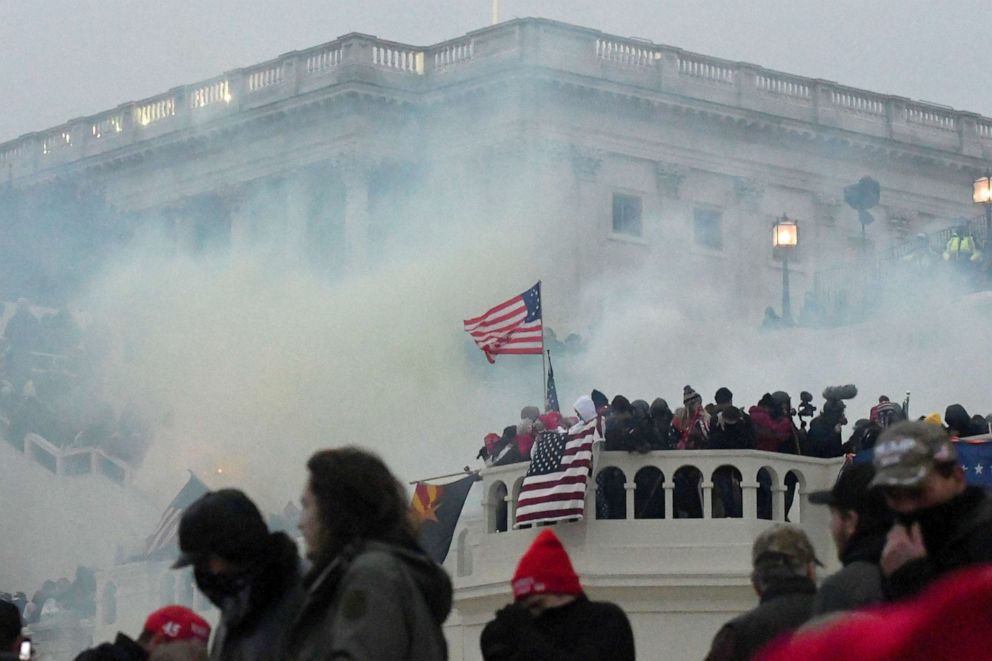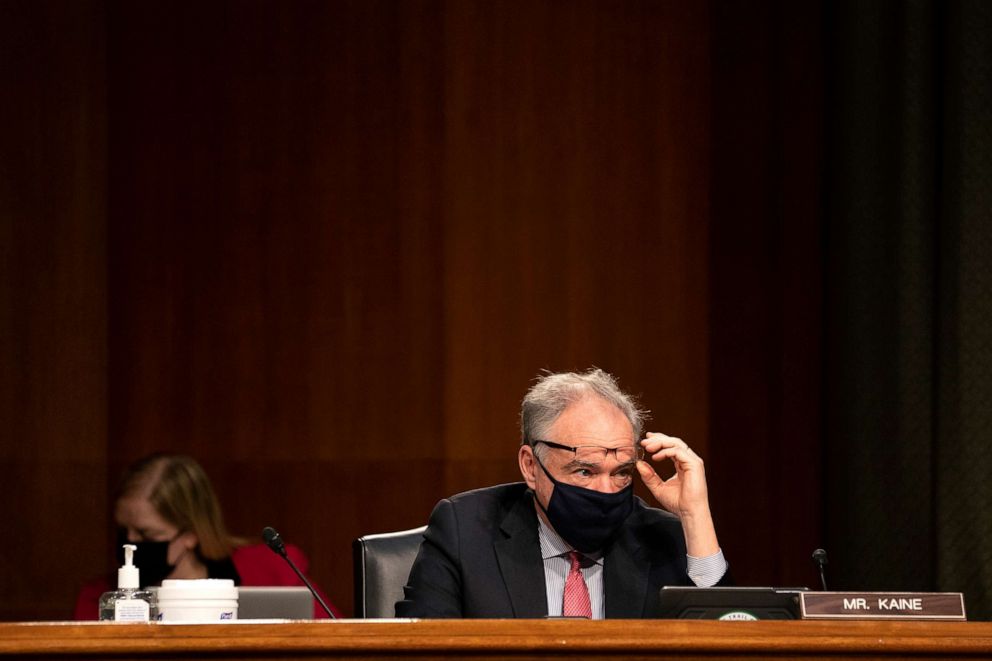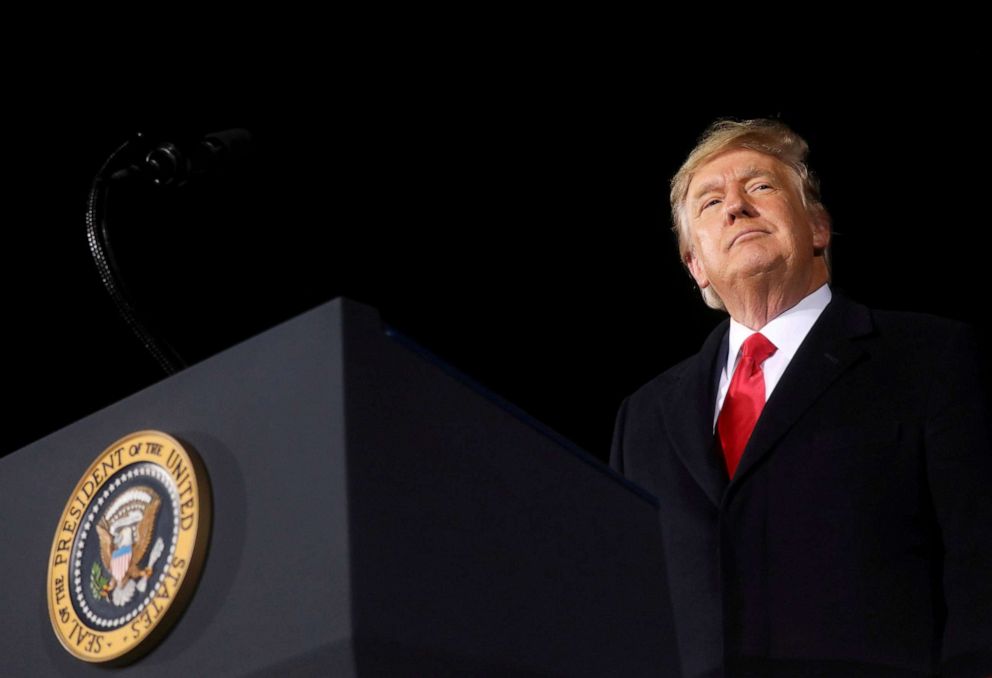Bipartisan Senate duo crafts censure resolution that seeks to bar Trump from office
The senators say censuring Trump is optimal given GOP objections to impeachment.
Capitol Hill -- With the outcome of former President Donald Trump’s second impeachment trial all but certain to end without a conviction, a bipartisan pair of senators is working on a resolution that for just the second time in history would censure a U.S. president -- and this one could potentially bar Trump from office.
Sens. Tim Kaine, D-Va., and Susan Collins, R-Maine, are crafting a resolution to censure Trump for inciting the Jan. 6 riot that left five dead, including a Capitol police officer. But it is not just any censure resolution. Sen. Chris Coons, D-Del., told reporters Tuesday that what Kaine and Collins are looking to do is “include the elements of the 14th Amendment that lead to disqualification from future office."
"That's intriguing to me and something I'm willing to look at. The bottom line here is we have to deliver accountability for the events of January 6,” Coons said.
That accountability -- through an impeachment trial, and a vote afterward to disqualify Trump from holding future office -- looked far less likely on Monday after 45 Republicans voted for a measure claiming that such a proceeding against a former president would be unconstitutional. Just five Republicans -- including Collins -- joined with Democrats in opposing the declaration, far short of the 67 votes needed to convict the president of “incitement of insurrection,” the charge in the House impeachment article.
Censure resolutions against presidents do not have the force of law but are a strong reprimand from one or both houses of Congress. It is unclear, however, what the possible inclusion of language from Section 3 of the 14th Amendment might mean.

That section reads: “No person shall be a Senator or Representative in Congress, or elector of President and Vice-President, or hold any office, civil or military, under the United States, or under any state, who, having previously taken an oath, as a member of Congress, or as an officer of the United States, or as a member of any State legislature, or as an executive or judicial officer of any State, to support the Constitution of the United States, shall have engaged in insurrection or rebellion against the same, or given aid or comfort to the enemies thereof.”
“[The resolution] is still in process,” Sen. Collins told reporters Tuesday, adding, “But I think yesterday's vote on the Senate floor shows that it is extremely unlikely that President Trump would be convicted and that indeed the five votes to even proceed to a trial is probably the high mark on what you're going to see for Republican support. So, it seems to me that there is some value in looking at an alternative to proceeding with the trial. It's obviously not my call, and I realize the two leaders have already locked in a schedule. But it seems to me there is benefit in looking at an alternative that might be able to garner bipartisan support.”
Collins said the resolution reprimanding the president, which is still being tweaked with no clear date for its introduction, would be in lieu of a trial, but Kaine said that wasn’t clear. One thing is certain, it would force Republicans to take a position on Trump’s actions rather than focusing on procedural arguments, something that supporters of the measure are using as a selling point to Democratic leadership.
"It declares that the attack on the Capitol was an insurrection against the Constitution of the United States. It was an effort to stop Congress from undertaking its constitutional duty to count electoral votes," Sen. Kaine described the resolution in a CNN interview. "It then finds that President Trump gave aid and comfort to those who carried out the insurrection by repeatedly lying about the election, slandering election officials, pressuring others to come to Washington for a wild event and encouraging them to come up to Congress. Those two findings, that it was an insurrection and that President Trump gave aid and comfort to the insurrectionists is language pulled right out of section 3 of the 14th Amendment of the Constitution. And that amendment says anybody who has taken an oath to defend the Constitution who either engages in an insurrection against the Constitution or gives aid and comfort to those who do will be barred from office again."
Kaine argued that censuring Trump would clear the issue quickly so that senators could focus on a top priority for Biden and many lawmakers -- getting trillions of dollars in additional COVID-19 relief out the door to needy Americans hurt by the pandemic.
“To do a trial knowing you'll get 55 votes at the max seems to me to be not the right prioritization of our time. Obviously we do a trial, maybe we can do it fast, but my top priority is COVID relief and getting the Biden cabinet approved,” said Kaine.

It’s unclear if the effort will go anywhere with the trial on track to begin on Feb. 9. And supporters of the measure are concerned that any effort to censure after the trial would lose steam.
Senate Majority Leader Chuck Schumer made his position clear Wednesday.
“Make no mistake, there will be a trial, and the evidence against the former president will be presented in living color for the nation and every one of us to see once again. No one will be able to avert their gaze from what Mr. trump said and did and the consequences of his actions,” he said.
Collins, however, said she is talking to her GOP colleagues about her proposal.
But John Thune, a member of Senate GOP leadership, said, “I just think it's so hypothetical at this point. The Democrats are very intent on going through the impeachment process. That's the vote that matters to them. I've heard some rumblings but not serious discussion that had support from enough Democrats or Republicans for that matter to make this a realistic option."
“We just need to move forward, and I hope that we'll do that and that history will hold those responsible accountable, those crimes committed. The criminal justice system will hold them accountable,” Sen. Marco Rubio, R-Fla., said. “But we need to be here spending 99.9% of our time working on behalf of the people who sent us here and the things that matter to them.”
Not all Democrats are on board, either. Sen. Joe Manchin, D-W.Va., said that Trump’s behavior -- which he blames for the insurrection -- is so serious that impeachment is the best option. The senator even floated the idea of a criminal prosecution.
“This is much, much more serious than anything we've ever seen in our lifetime, and it's really the purpose of having articles of impeachment in the Constitution,” said Manchin, adding that perhaps criminal charges were warranted.

“If there's a criminal trial or criminal pathway, maybe we should look at that...The bedrock of our democracy is innocent until proven guilty, and the president has had a good defense,” Manchin told reporters. “I don't know, we want to make sure that no one ever does this again -- never thinks about doing this again, sedition and insurrection.”
Congress has only ever successfully censured one president, Andrew Jackson, in a heated dispute over the Second Bank of the United States, which the head of state had unilaterally disbanded, firing a Cabinet secretary to do so. That censure was later expunged by a successor Senate, so some would consider the censure effort by Collins and Kaine -- if successful -- the first censure of a president.
To be sure, there have been attempts to formally reprimand prior presidents -- multiple attempts in Richard Nixon’s case -- but those efforts have died in committee. According to a Congressional Research Service report, resolutions against Nixon and President Bill Clinton also called for their resignations.





